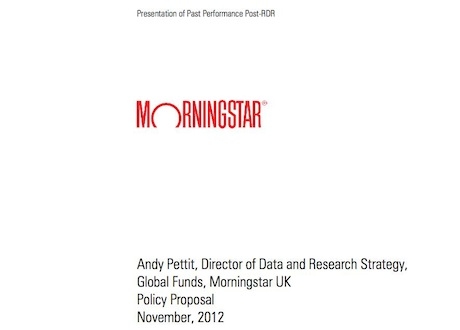
- Home
- News
Thursday, 22 November 2012 10:00
Morningstar to offer unadjusted approach to past performance

Morningstar is to provide an 'unadjusted' approach when presenting funds' past performance post-RDR.
This means it will make no adjustments for the differences in fees between the old and new share classes.
Under the RDR Morningstar will have to publish past performance that accommodates both existing, pre-RDR share classes and new commission-free share classes. Over 750 commission-free share classes have already been launched.
The solution proposed by Morningstar involves appending past performance records of existing fund retail classes to those of the new RDR share classes, thereby retaining the impact of the higher fees of existing classes.
{desktop}{/desktop}{mobile}{/mobile}
Andy Pettit, Morningstar's director of data and research strategy for global funds, said: "With both pre-RDR and post-RDR share classes now existing, it is no simple matter to determine a way to present historical fund performance that is both systematic and consistent across the fund universe going forward.
"We believe our solution gives investors the clearest possible view of how their investments have performed over time."
The firm said the unadjusted approach sacrificed any accounting for the performance boost that would be provided by the lower costs on the new class but that it did remove any risk of overstating the performance that the RDR share class might have achieved if it had existed. It also did not imply that the industry had served investors better in the past than was actually the case.
The merits to the unadjusted approach were cited as being that it was closer to what a typical retail investor could have achieved, was a more cautious approach and was more consistent with the established precedent in UK, European and US markets.
• Want to receive a free weekly summary of the best news stories from our website? Just go to home page and submit your name and email address. If you are already logged in you will need to log out to see the e-newsletter sign up. You can then log in again.
This means it will make no adjustments for the differences in fees between the old and new share classes.
Under the RDR Morningstar will have to publish past performance that accommodates both existing, pre-RDR share classes and new commission-free share classes. Over 750 commission-free share classes have already been launched.
The solution proposed by Morningstar involves appending past performance records of existing fund retail classes to those of the new RDR share classes, thereby retaining the impact of the higher fees of existing classes.
{desktop}{/desktop}{mobile}{/mobile}
Andy Pettit, Morningstar's director of data and research strategy for global funds, said: "With both pre-RDR and post-RDR share classes now existing, it is no simple matter to determine a way to present historical fund performance that is both systematic and consistent across the fund universe going forward.
"We believe our solution gives investors the clearest possible view of how their investments have performed over time."
The firm said the unadjusted approach sacrificed any accounting for the performance boost that would be provided by the lower costs on the new class but that it did remove any risk of overstating the performance that the RDR share class might have achieved if it had existed. It also did not imply that the industry had served investors better in the past than was actually the case.
The merits to the unadjusted approach were cited as being that it was closer to what a typical retail investor could have achieved, was a more cautious approach and was more consistent with the established precedent in UK, European and US markets.
• Want to receive a free weekly summary of the best news stories from our website? Just go to home page and submit your name and email address. If you are already logged in you will need to log out to see the e-newsletter sign up. You can then log in again.
This page is available to subscribers. Click here to sign in or get access.
